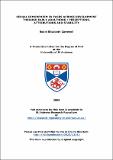Sexual dimorphism in faces across development through early adulthood : perceptions, attributions and stability
Abstract
In this thesis, I use a Darwinian approach to explore the role of sexual-dimorphism in human behaviour across development and into early adulthood, and its impact on adult mating-strategies. In Studies 1-2, I explore the importance of heredity and developmental stability of facial characteristics in light of theories of sexual selection. Using family photos, judgements of faces of parents and offspring revealed that facial sexual-dimorphism is passed on from father to son and mother to daughter, while inheritance of attractiveness is apparent only in daughters. I also examine the stability of facial appearance across development (infancy, childhood, young-adult), and find that sexual-dimorphism remains stable for both sexes, while attractiveness is stable only in females. Feminine characteristics are perceived as attractive in infant faces, and feminine characteristics have been perceived as looking more neotenous. In light of these data, I develop a theory for increased preferences for neoteny in human infants (Chapter 4). In studies 3-4, I examine the developmental milestones, puberty and first sexual intercourse in relationship to adult mate-choice strategies. Women who experience first coitus early prefer increased facial-masculinity in potential mates. In men, both early coitus and early puberty relate to increased preferences for facial-femininity in potential mates. In study 5, I look at attributions of peri-pubertal children (aged 11-12 years) to peer faces manipulated on sexually-dimorphic features. Children's attractiveness judgements show evidence of adult-like preferences, with boys preferring feminine girls' faces and girls preferring feminised boys' faces. Both girls and boys attribute the negative stereotype of bullying to more masculinised boys' faces. Study 6 concerns the relationship between two modalities of sexual-dimorphism, pheromones and facial characteristics. Adults indicate preferences from a continuum of sexually-dimorphic face-shapes, in addition to rating sex-specific pheromones on pleasantness. Individuals who prefer sex-typical facial characteristics in opposite-sex faces also judged the sex-typical pheromone as more pleasant.
Type
Thesis, PhD Doctor of Philosophy
Collections
Items in the St Andrews Research Repository are protected by copyright, with all rights reserved, unless otherwise indicated.

